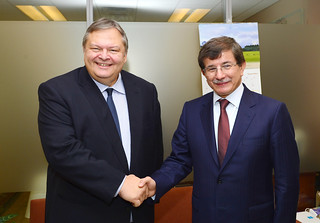| (Photo credit: Υπουργείο Εξωτερικών) |
The Other Side to the Visit, by Stavros Lygeros
The headlines may have been stolen during Ahmet Davutoglu’s visit to Athens by his reference to a ‘free’ Aegean, which was attributed to mistranslation, but, as usual, the essence lies elsewhere. We don’t need to tie ourselves in knots trying to decipher what the Turkish foreign minister meant by a ‘free’ Aegean to learn Turkey’s true intentions. Ankara is consistently and clearly projecting its positions and making sure to back up its words with deeds.
The Turkish foreign minister’s rhetoric is a classic case of public diplomacy. He doesn’t confuse foreign policy with public relations. He knows, however, how to use public relations and rhetorical flourishes in pursuit of strategy. Davutoglu wants to convince Greek public opinion that not only does Turkey not pose a threat to Greece, but that Turkey is also sincerely working to extricate bilateral relations from the prejudices of the past.
To overcome Greek skepticism and induce Athens to fall in line behind his strategic vision, Davutoglu is talking up the potential of Turkey and Greece having a common role in the region. But, for Turkey, what this common role entails is turning Greece into a satellite in the Neo-Ottoman orbit. Thus, while Turkish diplomacy cultivates a climate of settling differences, it doesn’t abandon its long-held expansionist designs and provocative actions aimed at Greece.
A typical example is the unilateral and arbitrary delineation of Turkey’s maritime borders in the Eastern Mediterranean. Thus, at the beginning of 2011, Ankara announced its intention to carve out 11 maritime zones totalling an area of 20.000 square kilometers, south, south-east and south-west of Attalia. Some of these ‘zones’ violate the median line principle and penetrate deep into the Greek and Cypriot continental shelves. Also, in April 2011, Turkey published maps in its official gazette that showed clear disregard for the Cypriot and Greek continental shelves, while, in September, Turkey gave substance to its arbitrary decisions by submitting documents to the UN confirming what it perceives to be the delineation of maritime borders and continental shelves in the region.
While Turkey attempts to create faits accompli with arbitrary and unilateral actions, Davutoglu tries to prevent Greece from exercising its legal rights. The Turkish foreign minister expressed to his Greek counterpart Turkey’s opposition to any declaration by Greece of its Exclusive Economic Zone before agreement on the delineation of territorial waters and continental shelves. Thus, Ankara has managed to transform its unilateral claims against Greece into bilateral issues, projecting its threats as a legitimate defence of its rights.
Greece has a legal right to extend its territorial waters to 12 nautical miles and it is a right that can be exercised unilaterally. By insisting that such a declaration would be a cause for war, Ankara has transformed a Greek right into a subject of negotiations. Turkey is trying to do exactly the same on the EEZ issue. Greek foreign minister Dimitris Avraamopoulos must come clean and reveal if it’s true that he told his Turkish counterpart that Greece, for the time being, will not declare its EEZ.
In his discussions with Avraamopoulos, Davutoglu also reiterated Turkey’s position on the exclusion of Kastellorizo from the exploratory talks taking place between Greece and Turkey on maritime borders. Ankara sees Kastellorizo not as the last link in a chain of Greek islands, but as a detached island lying off the Turkish coast.
Turkey insists that Greek islands do not have a continental shelf and, in this way, Ankara reveals its claim to the continental shelf east of the Rhodes-Karpathos-Kassos-Crete line. Indeed, on 13-14 November 2008, Turkey announced that it was undertaking geological surveys south of Kastellorizo. This was a tangible warning to Athens not to declare its EEZ and proceed with its own research. A few days earlier, the then chief of the Turkish navy, Metin Atac, said: ‘I believe that the Eastern Mediterranean will become the scene of friction and clashes, because in the near future it will acquire increasing importance. Its oil deposits will make it a second Gulf, and Turkey must be alert and react.’
Just as in the Aegean, the Turks are using ‘surveys’ and ‘research’ in the Eastern Mediterranean as a means to provoke crises and prevent Greece from exercising its legal rights to explore for hydrocarbons.
Athens fears Turkish research in the Greek continental shelf, a fear that Turkey cultivates with the continuous and intense presence of its airforce and navy in the region, which is intended to show that Turkey has placed under its military control the sea running from Rhodes to Crete and Cyprus. Overall, Turkey’s aim is to oblige Greece to agree to a sharing of deposits or joint exploration – sharing and joint exploration of Greek resources.





